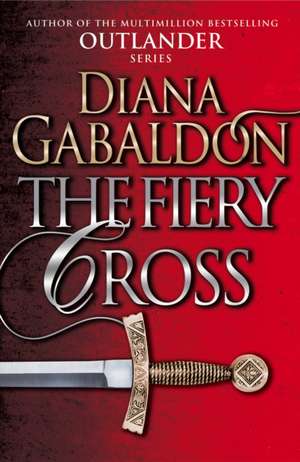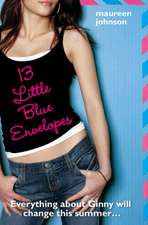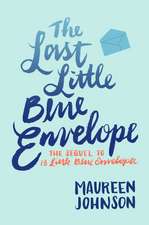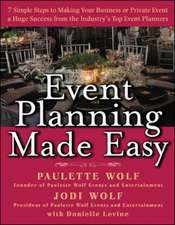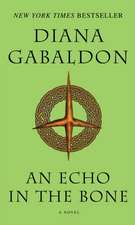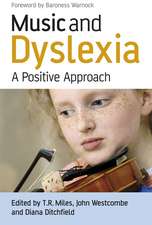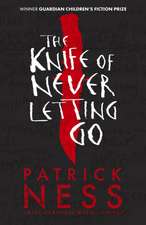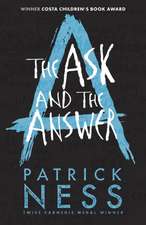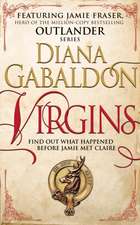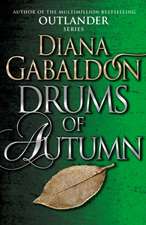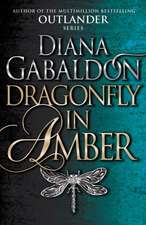The Fiery Cross: Outlander, cartea 5
Autor Diana Gabaldonen Limba Engleză Paperback – 19 feb 2015
______________
1771: the Colony of North Carolina stands in an uneasy balance, with the rich, colonial aristocracy on one side and the struggling pioneers of the backcountry on the other.
Between them stands Jamie Fraser, a man of honour, a man of worth. Exiled from his beloved Scotland, he is at last possessed of the land he has longed for. By his side his extraordinary wife, Claire, a woman out of time and out of place, blessed with the uneasy gift of the knowledge of what is to come.
In the past, that knowledge has brought both danger and deliverance to Jamie and Claire. Now it could be a flickering torch that will light their way through the perilous years ahead - or might ignite a conflagration that will leave their lives in ashes.
______________
Readers can't get enough of The Fiery Cross . . .
***** 'Love, love, love.'
***** 'I absolutely LOVE these books. This installment was no exception.....'
***** 'Sigh of contentment: Book Five is one of my favorite installments in one of my all-time favorite series.'
***** 'SO. MUCH. AWESOME.'
***** 'This is a most excellent novel.'
| Toate formatele și edițiile | Preț | Express |
|---|---|---|
| Paperback (3) | 60.18 lei 24-30 zile | +37.87 lei 5-11 zile |
| Random House – 19 feb 2015 | 60.18 lei 24-30 zile | +37.87 lei 5-11 zile |
| Dell Publishing Company – 31 aug 2005 | 62.13 lei 3-5 săpt. | +24.30 lei 5-11 zile |
| DELTA – 30 sep 2002 | 129.92 lei 3-5 săpt. | |
| Hardback (1) | 247.47 lei 3-5 săpt. | |
| Delacorte Press – 31 oct 2001 | 247.47 lei 3-5 săpt. |
Din seria Outlander
- 16%
 Preț: 53.31 lei
Preț: 53.31 lei - 22%
 Preț: 56.11 lei
Preț: 56.11 lei - 11%
 Preț: 60.61 lei
Preț: 60.61 lei - NaN%
 Preț: 270.07 lei
Preț: 270.07 lei - 32%
 Preț: 56.55 lei
Preț: 56.55 lei - 21%
 Preț: 56.42 lei
Preț: 56.42 lei - 16%
 Preț: 63.36 lei
Preț: 63.36 lei - 25%
 Preț: 67.20 lei
Preț: 67.20 lei -
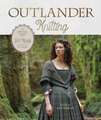 Preț: 136.20 lei
Preț: 136.20 lei -
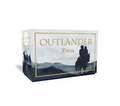 Preț: 126.43 lei
Preț: 126.43 lei - 20%
 Preț: 150.07 lei
Preț: 150.07 lei - 15%
 Preț: 247.57 lei
Preț: 247.57 lei - NaN%
 Preț: 318.76 lei
Preț: 318.76 lei - 16%
 Preț: 53.84 lei
Preț: 53.84 lei - 10%
 Preț: 61.88 lei
Preț: 61.88 lei -
 Preț: 264.65 lei
Preț: 264.65 lei - 10%
 Preț: 61.15 lei
Preț: 61.15 lei - 7%
 Preț: 65.00 lei
Preț: 65.00 lei - 7%
 Preț: 65.14 lei
Preț: 65.14 lei - 18%
 Preț: 83.45 lei
Preț: 83.45 lei -
 Preț: 125.02 lei
Preț: 125.02 lei -
 Preț: 216.93 lei
Preț: 216.93 lei
Preț: 60.18 lei
Preț vechi: 64.20 lei
-6% Nou
11.52€ • 11.98$ • 9.51£
Carte disponibilă
Livrare economică 27 martie-02 aprilie
Livrare express 08-14 martie pentru 47.86 lei
Specificații
ISBN-10: 1784751332
Pagini: 1412
Dimensiuni: 129 x 197 x 58 mm
Greutate: 0.82 kg
Editura: Random House
Colecția Arrow Books
Seria Outlander
Descriere
The Fifth Novel in the Bestselling Outlander Series - soon to be a major new TV series. The long fuse of rebellion has already been lit. It's 1772, the Royal Colony of North Carolina, and the governor calls upon Jamie Fraser to unite the backcountry and preserve the colony for King and Crown.
One minor problem: Jamie Fraser's wife, Claire, is a time-traveller, as are his daughter and son-in-law. And Jamie knows that three years hence, the shot heard round the world will be fired, and the end of it all will be independence - with those loyal to the King either dead or in exile. Beyond present danger, though, looms the threat of a tiny clipping from the Wilmington Gazette, dated 1776, which reports the destruction of the house on Fraser's Ridge and the death by fire of James Fraser and all his family.
For once, Jamie Fraser hopes the time-travelers in his family are wrong about the future. But only time will tell.
Notă biografică
Diana Gabaldon is the author of Lord John and the Brotherhood of the Blade, Lord John and the Private Matter, and the New York Times bestselling Outlander novels. She won a 2006 Quill Award for her most recent Outlander novel, A Breath of Snow and Ashes.
From the Hardcover edition.
Extras
Mount Helicon
The Royal Colony of North Carolina
November, 1770
I woke to the patter of rain on canvas, with the feel of my first husband's kiss on my lips. I blinked, disoriented, and by reflex put my fingers to my mouth. To keep the feeling, or to hide it? I wondered, even as I did so.
Jamie stirred and murmured in his sleep next to me, his movement rousing a fresh wave of scent from the cedar branches under our bottom quilt. Perhaps the ghost's passing had disturbed him. I frowned at the empty air outside our lean-to.
Go away, Frank, I thought sternly.
It was still dark outside, but the mist that rose from the damp earth was a pearly gray; dawn wasn't far off. Nothing stirred, inside or out, but I had the distinct sense of an ironic amusement that lay on my skin like the lightest of touches.
Shouldn't I come to see her married?
I couldn't tell whether the words had formed themselves in my thoughts, or whether they - and that kiss — were merely the product of my own subconscious. I had fallen asleep with my mind still busy with wedding preparations; little wonder that I should wake from dreams of weddings. And wedding nights.
I smoothed the rumpled muslin of my shift, uneasily aware that it was rucked up around my waist and that my skin was flushed with more than sleep. I didn't remember anything concrete about the dream that had wakened me; only a confused jumble of image and sensation. I thought perhaps that was a good thing.
I turned over on the rustling branches, nudging close to Jamie. He was warm and smelled pleasantly of woodsmoke and whisky, with a faint tang of sleepy maleness under it, like the deep note of a lingering chord. I stretched myself, very slowly, arching my back so that my pelvis nudged his hip. If he were sound asleep or disinclined, the gesture was slight enough to pass unnoticed; if he were not...
He wasn't. He smiled faintly, eyes still closed, and a big hand ran slowly down my back, settling with a firm grip on my bottom.
"Mmm?" he said. "Hmmmm." He sighed, and relaxed back into sleep, holding on.
I nestled close, reassured. The immediate physicality of Jamie was more than enough to banish the touch of lingering dreams. And Frank — if that was Frank — was right, so far as that went. I was sure that if such a thing were possible, Bree would want both her fathers at her wedding.
I was wide awake now, but much too comfortable to move. It was raining outside; a light rain, but the air was cold and damp enough to make the cozy nest of quilts more inviting than the distant prospect of hot coffee. Particularly since the getting of coffee would involve a trip to the stream for water, making up the campfire — oh, God, the wood would be damp, even if the fire hadn't gone completely out — grinding the coffee in a stone quern and brewing it, while wet leaves blew round my ankles and drips from overhanging tree branches slithered down my neck.
Shivering at the thought, I pulled the top quilt up over my bare shoulder and instead resumed the mental catalogue of preparations with which I had fallen asleep.
Food, drink ... luckily I needn't trouble about that. Jamie's aunt Jocasta would deal with the arrangements; or rather, her black butler, Ulysses, would. Wedding guests — no difficulties there. We were in the middle of the largest Gathering of Scottish Highlanders in the Colonies, and food and drink were being provided. Engraved invitations would not be necessary.
Bree would have a new dress, at least; Jocasta's gift as well. Dark blue wool — silk was both too expensive and too impractical for life in the backwoods. It was a far cry from the white satin and orange blossom I had once envisioned her wearing to be married in — but then, this was scarcely the marriage anyone might have imagined in the 1960s.
I wondered what Frank might have thought of Brianna's husband. He likely would have approved; Roger was a historian — or once had been — like Frank himself. He was intelligent and humorous, a talented musician and a gentle man, thoroughly devoted to Brianna and little Jemmy.
Which is very admirable indeed, I thought in the direction of the mist, under the circumstances.
You admit that, do you? The words formed in my inner ear as though he had spoken them, ironic, mocking both himself and me.
Jamie frowned and tightened his grasp on my buttock, making small whuffling noises in his sleep.
You know I do, I said silently. I always did, and you know it, so just bugger off, will you?!
I turned my back firmly on the outer air and laid my head on Jamie's shoulder, seeking refuge in the feel of the soft, crumpled linen of his shirt.
I rather thought Jamie was less inclined than I — or perhaps Frank — to give Roger credit for accepting Jemmy as his own. To Jamie, it was a simple matter of obligation; an honorable man could not do otherwise. And I knew he had his doubts as to Roger's ability to support and protect a family in the Carolina wilderness. Roger was tall, well-built, and capable — but "bonnet, belt, and swordie" were the stuff of songs to Roger; to Jamie, they were the tools of his trade.
The hand on my bottom squeezed suddenly, and I started.
"Sassenach," Jamie said drowsily, "you're squirming like a toadling in a wee lad's fist. D'ye need to get up and go to the privy?"
"Oh, you're awake," I said, feeling mildly foolish.
"I am now," he said. The hand fell away, and he stretched, groaning. His bare feet popped out at the far end of the quilt, long toes spread wide.
"Sorry. I didn't mean to wake you."
"Och, dinna fash yourself," he assured me. He cleared his throat and rubbed a hand through the ruddy waves of his loosened hair, blinking. "I was dreaming like a fiend; I always do when I sleep cold." He lifted his head and peered down across the quilt, wiggling his exposed toes with disfavor. "Why did I not sleep wi' my stockings on?"
"Really? What were you dreaming about?" I asked, with a small stab of uneasiness. I rather hoped he hadn't been dreaming the same sort of thing I had.
"Horses," he said, to my immediate relief. I laughed.
"What sort of fiendish dreams could you be having about horses?"
"Oh, God, it was terrible." He rubbed his eyes with both fists and shook his head, trying to clear the dream from his mind. "All to do wi' the Irish kings. Ye ken what MacKenzie was sayin' about it, at the fire last night?"
"Irish ki — oh!" I remembered, and laughed again at the recollection. "Yes, I do."
Roger, flushed with the triumph of his new engagement, had regaled the company around the fireside the night before with songs, poems, and entertaining historical anecdotes — one of which concerned the rites with which the ancient Irish kings were said to have been crowned. One of these involved the successful candidate copulating with a white mare before the assembled multitudes, presumably to prove his virility — though I thought it would be a better proof of the gentleman's sangfroid, myself.
"I was in charge o' the horse," Jamie informed me. "And everything went wrong. The man was too short, and I had to find something for him to stand on. I found a rock, but I couldna lift it. Then a stool, but the leg came off in my hand. Then I tried to pile up bricks to make a platform, but they crumbled to sand. Finally they said it was all right, they would just cut the legs off the mare, and I was trying to stop them doing that, and the man who would be king was jerkin' at his breeks and complaining that his fly buttons wouldna come loose, and then someone noticed that it was a black mare, and that wouldna do at all."
I snorted, muffling my laughter in a fold of his shirt for fear of wakening someone camped near us.
"Is that when you woke up?"
"No. For some reason, I was verra much affronted at that. I said it would do, in fact the black was a much better horse, for everyone knows that white horses have weak een, and I said the offspring would be blind. And they said no, no, the black was ill luck, and I was insisting it was not, and..." He stopped, clearing his throat.
"And?"
He shrugged and glanced sideways at me, a faint flush creeping up his neck.
"Aye, well. I said it would do fine, I'd show them. And I had just grasped the mare's rump to stop her moving, and was getting ready to ... ah ... make myself king of Ireland. That's when I woke."
I snorted and wheezed, and felt his side vibrate with his own suppressed laughter.
"Oh, now I'm really sorry to have wakened you!" I wiped my eyes on the corner of the quilt. "I'm sure it was a great loss to the Irish. Though I do wonder how the queens of Ireland felt about that particular ceremony," I added as an afterthought.
"I canna think the ladies would suffer even slightly by comparison," Jamie assured me. "Though I have heard of men who prefer —"
"I wasn't thinking of that," I said. "It was more the hygienic implications, if you see what I mean. Putting the cart before the horse is one thing, but putting the horse before the queen..."
"The — oh, aye." He was flushed with amusement, but his skin darkened further at that. "Say what ye may about the Irish, Sassenach, but I do believe they wash now and then. And under the circumstances, the king might possibly even have found a bit of soap useful, in ... in..."
"In medias res?" I suggested. "Surely not. I mean, after all, a horse is quite large, relatively speaking..."
"It's a matter of readiness, Sassenach, as much as room," he said, with a repressive glance in my direction. "And I can see that a man might require a bit of encouragement, under the circumstances. Though it's in medias res, in any case," he added. "Have ye never read Horace? Or Aristotle?"
"No. We can't all be educated. And I've never had much time for Aristotle, after hearing that he ranked women somewhere below worms in his classification of the natural world."
"The man can't have been married." Jamie's hand moved slowly up my back, fingering the knobs of my spine through my shift. "Surely he would ha' noticed the bones, else."
I smiled and lifted a hand to his own cheekbone, rising stark and clean above a tide of auburn stubble.
As I did so, I saw that the sky outside had lightened into dawn; his head was silhouetted by the pale canvas of our shelter, but I could see his face clearly. The expression on it reminded me exactly why he had taken off his stockings the night before. Unfortunately, we had both been so tired after the prolonged festivities that we had fallen asleep in mid-embrace.
I found that belated memory rather reassuring, offering as it did some explanation both for the state of my shift and for the dreams from which I had awakened. At the same time, I felt a chilly draft slide its fingers under the quilt, and shivered. Frank and Jamie were very different men, and there was no doubt in my mind as to who had kissed me, just before waking.
"Kiss me," I said suddenly to Jamie. Neither of us had yet brushed our teeth, but he obligingly skimmed my lips with his, then, when I caught the back of his head and pressed him closer, shifted his weight to one hand, the better to adjust the tangle of bedclothes round our lower limbs.
"Oh?" he said, when I released him. He smiled, blue eyes creasing into dark triangles in the dimness. "Well, to be sure, Sassenach. I must just step outside for a moment first, though."
He flung back the quilt and rose. From my position on the ground, I had a rather unorthodox view which provided me with engaging glimpses under the hem of his long linen shirt. I did hope that what I was looking at was not the lingering result of his nightmare, but thought it better not to ask.
"You'd better hurry," I said. "It's getting light; people will be up and about soon."
He nodded and ducked outside. I lay still, listening. A few birds cheeped faintly in the distance, but this was autumn; not even full light would provoke the raucous choruses of spring and summer. The mountain and its many camps still lay slumbering, but I could feel small stirrings all around, just below the edge of hearing.
I ran my fingers through my hair, fluffing it out round my shoulders, and rolled over, looking for the water bottle. Feeling cool air on my back, I glanced over my shoulder, but dawn had come and the mist had fled; the air outside was gray but still.
I touched the gold ring on my left hand, restored to me the night before, and still unfamiliar after its long absence. Perhaps it was his ring that had summoned Frank to my dreams. Perhaps tonight at the wedding ceremony, I would touch it again, deliberately, and hope that he could see his daughter's happiness somehow through my eyes. For now, though, he was gone, and I was glad.
A small sound, no louder than the distant birdcalls, drifted through the air. The brief cry of a baby waking.
I had once thought that no matter the circumstances, there ought really to be no more than two people in a marriage bed. I still thought so. However, a baby was more difficult to banish than the ghost of a former love; Brianna and Roger's bed must perforce accommodate three.
The edge of the canvas lifted, and Jamie's face appeared, looking excited and alarmed.
"Ye'd best get up and dress, Claire," he said. "The soldiers are drawn up by the creek. Where are my stockings?"
I sat bolt upright, and far down the mountainside the drums began to roll.
Cold fog lay like smoke in the hollows all round; a cloud had settled on Mount Helicon like a broody hen on a single egg, and the air was thick with damp. I blinked blearily across a stretch of rough grass, to where a detachment of the 67th Highland regiment was drawn up in full splendor by the creek, drums rumbling and the company piper tootling away, grandly impervious to the rain.
I was very cold, and more than slightly cross. I’d gone to bed in the expectation of waking to hot coffee and a nourishing breakfast, this to be followed by two weddings, three christenings, two tooth extractions, the removal of an infected toenail, and other entertaining forms of wholesome social intercourse requiring whisky.
Instead, I’d been wakened by unsettling dreams, led into amorous dalliance, and then dragged out into a cold drizzle in medias bloody res, apparently to hear a proclamation of some sort. No coffee yet, either. It had taken some time for the Highlanders in their camps to rouse themselves and stagger down the hillside, and the piper had gone quite purple in the face before he at last blew the final blast and left off with a discordant wheeze. The echoes were still ringing off the mountainside, as Lieutenant Archibald Hayes stepped out before his men. Lieutenant Hayes’s nasal Fife accent carried well, and the wind was with him. Still, I was sure the people farther up the mountain could hear very little. Standing as we did at the foot of the slope, though, we were no more than twenty yards from the Lieutenant and I could hear every word, in spite of the chattering of my teeth.
“By his EXCELLENCY, WILLIAM TRYON, Esquire, His Majesty’s Captain-General, Governor, and Commander-in-Chief, in and over the said Province,” Hayes read, lifting his voice in a bellow to carry above the noises of wind and water, and the premonitory murmurs of the crowd. The moisture shrouded trees and rocks with dripping mist, the clouds spat
intermittent sleet and freezing rain, and erratic winds had lowered the temperature by some thirty degrees. My left shin, sensitive to cold, throbbed at the spot where I had broken the bone two years before. A person given to portents and metaphors might have been tempted to draw comparisons between the nasty weather and the reading of the Governor’s Proclamation, I thought—the prospects were similarly chill and foreboding. “Whereas,” Hayes boomed, glowering at the crowd over his paper, “I have received information that a great Number of outrageous and disorderly Persons did tumultuously assemble themselves together in the Town of Hillsborough, on the 24th and 25th of last Month, during the sitting of the Superior Court of Justice of that District to oppose the Just Measures of Government and in open Violation of the Laws of their Country, audaciously attacking his Majesty’s Associate Justice in the Execution of his Office, and barbarously beating and wounding several Persons in and during the sitting of said Court, and offering other enormous Indignities and Insults to his Majesty’s Government, committing the most violent Outrages on the Persons and properties of the Inhabitants of the said Town, drinking Damnation to their lawful Sovereign King George and Success to the Pretender—” Hayes paused, gulping air with which to accomplish the next clause. Inflating his chest with an audible whoosh, he read on: “To the End therefore, that the Persons concerned in the said outrageous Acts may be brought to Justice, I do, by the Advice and Consent of his Majesty’s Council, issue this my Proclamation, hereby requiring and strictly enjoining all his Majesty’s Justices of the Peace in this Government to make diligent Inquiry into the above recited Crimes, and to receive the Deposition of such Person or Persons as
shall appear before them to make Information of and concerning the same; which Depositions are to be transmitted to me, in Order to be laid before the General Assembly, at New Bern, on the 30th day of November next, to which time it stands Prorogued for the immediate Dispatch of Public Business.” A final inhalation; Hayes’s face was nearly as purple as the piper’s by now. “Given under my Hand, and the Great Seal of the Province, at New Bern, the 18th Day of October, in the 10th Year of his Majesty’s Reign, Anno Domini “Signed, William Tryon,” Hayes concluded, with a final puff of steamy breath.
“Do you know,” I remarked to Jamie, “I believe that was all one single sentence, bar the closing. Amazing, even for a politician.”
“Hush, Sassenach,” he said, his eyes still fixed on Archie Hayes. There was a subdued rumble from the crowd behind me, of interest and consternation— touched with a certain amount of amusement at the phrases regarding treasonous toasts.
This was a Gathering of Highlanders, many of them exiled to the Colonies in the wake of the Stuart Rising, and had Archie Hayes chosen to take official notice of what was said over the cups of ale and whisky passed round the fires the night before . . . but then, he had but forty soldiers with him, and whatever his own opinions of King George and that monarch’s possible damnation, he kept them wisely to himself. Some four hundred Highlanders surrounded Hayes’s small beachhead on the creekbank, summoned by the tattoo of drums. Men and women sheltered among the trees above the clearing, plaids and arisaids pulled tight against the rising wind. They too were keeping their own counsel, judging from the array of stony faces visible under the flutter of scarves and bonnets. Of course, their expressions might derive from cold as much as from natural caution; my own cheeks were stiff, the end of my nose had gone numb, and I hadn’t felt my feet anytime since daybreak.
“Any person wishing to make declaration concerning these most serious matters may entrust such statements safely to my care,” Hayes announced, his round face an official blank. “I will remain in my tent with my clerk for the rest of the day. God save the King!”
He handed the Proclamation to his corporal, bowed to the crowd in dismissal, and turned smartly toward a large canvas tent that had been erected near the trees, regimental banners flapping wildly from a standard next to it.
Shivering, I slid a hand into the slit of Jamie’s cloak and over the crook of his arm, my cold fingers comforted by the warmth of his body. Jamie pressed his elbow briefly to his side in acknowledgment of my frozen grasp, but didn’t look
down at me; he was studying Archie Hayes’s retreating back, eyes narrowed against the sting of the wind.
A compact and solid man, of inconsequent height but considerable presence, the Lieutenant moved with great deliberation, as though oblivious of the crowd on the hillside above. He vanished into his tent, leaving the flap invitingly tied up.
Not for the first time, I reluctantly admired Governor Tryon’s political instincts. This Proclamation was clearly being read in towns and villages throughout the colony; he could have relied on a local magistrate or sheriff to carry his message of official fury to this Gathering. Instead, he had taken the trouble to send Hayes.
Archibald Hayes had taken the field at Culloden by his father’s side, at the age of twelve. Wounded in the fight, he had been captured and sent south. Presented with a choice of transportation or joining the army, he had taken the
King’s shilling and made the best of it. The fact that he had risen to be an officer in his mid-thirties, in a time when most commissions were bought rather than earned, was sufficient testimony to his abilities. He was as personable as he was professional; invited to share our food and fire the day before, he had spent half the night talking with Jamie—and the other half moving from fire to fire under the aegis of Jamie’s presence, being introduced to the heads of all the important families present. And whose notion had that been? I wondered, looking up at Jamie. His
long, straight nose was reddened by the cold, his eyes hooded from the wind, but his face gave no inkling of what he was thinking. And that, I thought, was a bloody good indication that he was thinking something rather dangerous.
Had he known about this Proclamation?
No English officer, with an English troop, could have brought such news into a Gathering like this, with any hope of cooperation. But Hayes and his Highlanders, stalwart in their tartan . . . I didn’t miss the fact that Hayes had had his tent erected with its back to a thick grove of pines; anyone who wished to speak to the Lieutenant in secret could approach through the woods, unseen. “Does Hayes expect someone to pop out of the crowd, rush into his tent, and surrender on the spot?” I murmured to Jamie. I personally knew of at least a dozen men among those present who had taken part in the Hillsborough riots; three of them were standing within arm’s length of us. Jamie saw the direction of my glance and put his hand over mine, squeezing it in a silent adjuration of discretion. I lowered my brows at him; surely he didn’t think I would give anyone away by inadvertence? He gave me a faint smile and one of those annoying marital looks that said, more plainly than words, You know how ye are, Sassenach. Anyone who sees your face kens just what ye think.
I sidled in a little closer, and kicked him discreetly in the ankle. I might have a glass face, but it certainly wouldn’t arouse comment in a crowd like this! He didn’t wince, but the smile spread a little wider. He slid one arm inside my
cloak, and drew me closer, his hand on my back. Hobson, MacLennan, and Fowles stood together just in front of us, talking quietly among themselves. All three came from a tiny settlement called Drunkard’s Creek, some fifteen miles from our own place on Fraser’s Ridge. Hugh Fowles was Joe Hobson’s son-in-law, and very young, no more than twenty. He was doing his best to keep his composure, but his face had gone white and clammy as the Proclamation was read. I didn’t know what Tryon intended to do to anyone who could be proved to have had a part in the riot, but I could feel the currents of unrest created by the Governor’s Proclamation passing through the crowd like the eddies of water rushing over rocks in the nearby creek.
Several buildings had been destroyed in Hillsborough, and a number of public officials dragged out and assaulted in the street. Gossip had it that one ironically titled justice of the peace had lost an eye to a vicious blow aimed with a horsewhip. No doubt taking this demonstration of civil disobedience to heart, Chief Justice Henderson had escaped out of a window and fled the town, thus effectively preventing the Court from sitting. It was clear that the Governor was very annoyed about what had happened in Hillsborough. Joe Hobson glanced back at Jamie, then away. Lieutenant Hayes’s presence at our fire the previous evening had not gone unremarked. If Jamie saw the glance, he didn’t return it. He lifted one shoulder in a shrug, tilting his head down to speak to me. “I shouldna think Hayes expects anyone to give themselves up, no. It may be his duty to ask for information; I thank God it isna mine to answer.” He hadn’t spoken loudly, but loudly enough to reach the ears of Joe Hobson. Hobson turned his head and gave Jamie a small nod of wry acknowledgment. He touched his son-in-law’s arm, and they turned away, scrambling up the slope toward the scattered campsites above, where their womenfolk were tending the fires and the younger children. This was the last day of the Gathering; tonight there would be marryings and christenings, the formal blessing of love and its riotous fruits, sprung from the loins of the unchurched multitude during the year before. Then the last songs would be sung, the last stories told, and dancing done amid the leaping flames of many fires—rain or no rain. Come morning, the Scots and their households would all disperse back to their homes, scattered from the settled banks of the Cape Fear River to the wild mountains of the west—carrying news of the Governor’s Proclamation and the doings at Hillsborough. I wiggled my toes inside my damp shoes and wondered uneasily who among the crowd might think it their duty to answer Hayes’s invitation to confession or incrimination. Not Jamie, no. But others might. There had been a good deal of boasting about the riots in Hillsborough during the week of the Gathering, but not all the listeners were disposed to view the rioters as heroes, by any means.
I could feel as well as hear the mutter of conversation breaking out in the wake of the Proclamation; heads turning, families drawing close together, men moving from group to group, as the content of Hayes’s speech was relayed up the hill, repeated to those who stood too far away to have heard it.
“Shall we go? There’s a lot to do yet before the weddings.”
“Aye?” Jamie glanced down at me. “I thought Jocasta’s slaves were managing the food and drink. I gave Ulysses the barrels of whisky—he’ll be soghan.”
“Ulysses? Did he bring his wig?” I smiled at the thought. The soghan was the man who managed the dispensing of drink and refreshment at a Highland wedding; the term actually meant something like “hearty, jovial fellow.” Ulysses
was possibly the most dignified person I had ever seen—even without his livery and powdered horsehair wig.
“If he did, it’s like to be stuck to his head by the evening.” Jamie glanced up at the lowering sky and shook his head. “Happy the bride the sun shines on,” he quoted. “Happy the corpse the rain falls on.”
“That’s what I like about Scots,” I said dryly. “An appropriate proverb for all occasions. Don’t you dare say that in front of Bree.”
“What d’ye take me for, Sassenach?” he demanded, with a half-smile down at me. “I’m her father, no?”
“Definitely yes.” I suppressed the sudden thought of Brianna’s other father, and glanced over my shoulder, to be sure she wasn’t in hearing. There was no sign of her blazing head among those nearby. Certainly her father’s daughter, she stood six feet tall in her stocking feet; nearly as easy as Jamie himself to pick out of a crowd.
“It’s not the wedding feast I need to deal with, anyway,” I said, turning back to Jamie. “I’ve got to manage breakfast, then do the morning clinic with Murray MacLeod.”
“Oh, aye? I thought ye said wee Murray was a charlatan.”
“I said he was ignorant, stubborn, and a menace to the public health,” I corrected.
“That’s not the same thing—quite.”
“Quite,” said Jamie, grinning. “Ye mean to educate him, then—or poison him?”
“Whichever seems most effective. If nothing else, I might accidentally step on his fleam and break it; that’s probably the only way I’ll stop him bleeding people. Let’s go, though, I’m freezing!”
“Aye, we’ll away, then,” Jamie agreed, with a glance at the soldiers, still drawn up along the creekbank at parade rest. “No doubt wee Archie means to keep his lads there ’til the crowd’s gone; they’re going a wee bit blue round the edges.”
Though fully armed and uniformed, the row of Highlanders was relaxed; imposing, to be sure, but no longer threatening. Small boys—and not a few wee girls—scampered to and fro among them, impudently flicking the hems of
the soldiers’ kilts or dashing in, greatly daring, to touch the gleaming muskets, dangling canteens, and the hilts of dirks and swords. “Abel, a charaid!” Jamie had paused to greet the last of the men from Drunkard’s Creek. “Will ye ha’ eaten yet the day?”
MacLennan had not brought his wife to the Gathering, and thus ate where luck took him. The crowd was dispersing around us, but he stood stolidly in place, holding the ends of a red flannel handkerchief pulled over his balding head against the spatter of rain. Probably hoping to cadge an invitation to breakfast, I thought cynically.
I eyed his stocky form, mentally estimating his possible consumption of eggs, parritch, and toasted bread against the dwindling supplies in our hampers. Not that simple shortage of food would stop any Highlander from offering hospitality—certainly not Jamie, who was inviting MacLennan to join us, even as I mentally divided eighteen eggs by nine people instead of eight. Not fried, then; made into fritters with grated potatoes, and I’d best borrow more coffee from Jocasta’s campsite on the way up the mountain. We turned to go, and Jamie’s hand slid suddenly downward over my backside.
I made an undignified sound, and Abel MacLennan turned round to gawkat me. I smiled brightly at him, resisting the urge to kick Jamie again, lessdiscreetly.
MacLennan turned away, and scrambled up the slope in front of us withalacrity, coattails bouncing in anticipation over worn breeks. Jamie put a hand under my elbow to help me over the rocks, bending down as he did so to mutterin my ear.
“Why the devil are ye not wearing a petticoat, Sassenach?” he hissed. “Ye’ve nothing at all on under your skirt—you’ll catch your death of cold!”
“You’re not wrong there,” I said, shivering in spite of my cloak. I did in fact have on a linen shift under my gown, but it was a thin, ragged thing, suitable for rough camping-out in summertime, but quite insufficient to stem the wintry
blasts that blew through my skirt as though it were cheesecloth.
“Ye had a fine woolen petticoat yesterday. What’s become of it?”
“You don’t want to know,” I assured him.
His eyebrows went up at this, but before he could ask further questions, a scream rang out behind us.
“Germain!”
I turned to see a small blond head, hair flying as the owner streaked down the slope below the rocks. Two-year-old Germain had taken advantage of his mother’s preoccupation with his newborn sister to escape custody and make a dash for the row of soldiers. Eluding capture, he charged headlong down the slope, picking up speed like a rolling stone. “Fergus!” Marsali screamed. Germain’s father, hearing his name, turned round from his conversation, just in time to see his son trip over a rock and fly headlong. A born acrobat, the little boy made no move to save himself, but collapsed gracefully, rolling into a ball like a hedgehog as he struck the grassy slope on one shoulder. He rolled like a cannonball through the ranks of soldiers, shot off the edge of a rocky shelf, and plopped with a splash into the creek. There was a general gasp of consternation, and a number of people ran down the hill to help, but one of the soldiers had already hurried to the bank. Kneeling, he thrust the tip of his bayonet through the child’s floating clothes
and towed the soggy bundle to the shore.
Fergus charged into the icy shallows, reaching out to clasp his waterlogged son.
“Merci, mon ami, merci beaucoup,” he said to the young soldier. “Et toi, garnement,” he said, addressing his spluttering offspring with a small shake. “Comment vas-tu, ye wee chowderheid?”
The soldier looked startled, but I couldn’t tell whether the cause was Fergus’s unique patois, or the sight of the gleaming hook he wore in place of his missing left hand.
“That’s all right then, sir,” he said, with a shy smile. “He’ll no be damaged, I think.”
Brianna appeared suddenly from behind a chinkapin tree, six-month-old Jemmy on one shoulder, and scooped baby Joan neatly out of Marsali’s arms. “Here, give Joanie to me,” she said. “You go take care of Germain.”
Jamie swung the heavy cloak from his shoulders and laid it in Marsali’s arms in place of the baby.
“Aye, and tell the soldier laddie who saved him to come and share our fire,” he told her. “We can feed another, Sassenach?”
“Of course,” I said, swiftly readjusting my mental calculations. Eighteen eggs, four loaves of stale bread for toast—no, I should keep back one for the trip home tomorrow—three dozen oatcakes if Jamie and Roger hadn’t eaten them already, half a jar of honey . . .
Marsali’s thin face lighted with a rueful smile, shared among the three of us, then she was gone, hastening to the aid of her drenched and shivering menfolk. Jamie looked after her with a sigh of resignation, as the wind caught the full
sleeves of his shirt and belled them out with a muffled whoomp. He crossed his arms across his chest, hunching his shoulders against the wind, and smiled down at me, sidelong.“Ah, well. I suppose we shall both freeze together, Sassenach. That’s all right, though. I wouldna want to live without ye, anyway.”
“Ha,” I said amiably. “You could live naked on an ice floe, Jamie Fraser, and melt it. What have you done with your coat and plaid?” He wore nothing besides his kilt and sark save shoes and stockings, and his high cheekbones were
reddened with cold, like the tips of his ears. When I slipped a hand back inside the crook of his arm, though, he was warm as ever.
“Ye dinna want to know,” he said, grinning. He covered my hand with one large, callused palm. “Let’s go; I’m starved for my breakfast.”
“Wait,” I said, detaching myself. Jemmy was indisposed to share his mother’s embrace with the newcomer, and howled and squirmed in protest, his small round face going red with annoyance under a blue knitted cap. I reached out and took him from Brianna, as he wriggled and fussed in his wrappings.
“Thanks, Mama.” Brianna smiled briefly, boosting tiny Joan into a more secure position against her shoulder. “Are you sure you want that one, though? This one’s quieter—and weighs half as much.”
“No, he’s all right. Hush, sweetie, come see Grannie.” I smiled as I said it, with the still-new feeling of mingled surprise and delight that I could actually be someone’s grandmother. Recognizing me, Jemmy abandoned his fuss and went promptly into his mussel-clinging-to-a-rock routine, chubby fists gripped tight in my hair. Disentangling his fingers, I peered over his head, but things below seemed under control.
Fergus, breeches and stockings soaking wet, Jamie’s cloak draped round his shoulders, was wringing out his shirtfront one-handed, saying something to the soldier who had rescued Germain. Marsali had whipped off her arisaid and wrapped the little boy in it, her loosened blond hair flying out from under her kerch like cobwebs in the wind.
Lieutenant Hayes, attracted by the noise, was peering out from the flap of his tent like a whelk from its shell. He looked up, and caught my eye; I waved briefly, then turned to follow my own family back to our campsite. Jamie was saying something to Brianna in Gaelic, as he helped her over a rocky patch in the trail ahead of me.
“Yes, I’m ready,” she said, replying in English. “Where’s your coat, Da?”
“I lent it to your husband,” he said. “We dinna want him to look a beggar at your wedding, aye?”
Bree laughed, wiping a flying strand of red hair out of her mouth with her free hand.
“Better a beggar than an attempted suicide.”
“A what?” I caught up with them as we emerged from the shelter of the rocks. The wind barreled across the open space, pelting us with sleet and bits of stinging gravel, and I pulled the knitted cap further down over Jemmy’s ears,
then pulled the blanket up over his head.
“Whoof!” Brianna hunched over the swaddled baby girl she carried, sheltering her from the blast. “Roger was shaving when the drums started up; he nearly cut his throat. The front of his coat is covered with bloodstains.” She glanced at Jamie, eyes watering with the wind. “So you’ve seen him this morning. Where is he now, do you know?”
“The lad’s in one piece,” he assured her. “I told him to go and talk wi’ Father Donahue, while Hayes was about his business.” He gave her a sharp look. “Ye might have told me the lad was no a Catholic.”
“I might,” she said, unperturbed. “But I didn’t. It’s no big deal to me.”
“If ye mean by that peculiar expression, that it’s of no consequence—”
Jamie began with a distinct edge in his voice, but was interrupted by the appearance of Roger himself, resplendent in a kilt of green-and-white MacKenzie tartan, with the matching plaid draped over Jamie’s good coat and waistcoat. The coat fit decently—both men were of a size, long-limbed and broad-shouldered, though Jamie was an inch or two the taller—and the gray wool was quite as becoming to Roger’s dark hair and olive skin as it was to Jamie’s burnished
auburn coloring.
“You look very nice, Roger,” I said. “Where did you cut yourself ?” His face was pink, with the raw look common to just-shaved skin, but otherwise unmarked. Roger was carrying Jamie’s plaid under his arm, a bundle of red and black
tartan. He handed it over and tilted his head to one side, showing me the deep gash just under his jawbone.
“Just there. Not so bad, but it bled like the dickens. They don’t call them cutthroat razors for nothing, aye?”
The gash had already crusted into a neat dark line, a cut some three inches long, angled down from the corner of his jaw across the side of his throat. I touched the skin near it briefly. Not bad; the blade of the razor had cut straight in, no flap of skin needing suture. No wonder it had bled a lot, though; it did look as though he had tried to cut his throat.
“A bit nervous this morning?” I teased. “Not having second thoughts, are you?”
“A little late for that,” Brianna said dryly, coming up beside me. “Got a kid who needs a name, after all.”
“He’ll have more names than he knows what to do with,” Roger assured her. “So will you—Mrs. MacKenzie.”
A small flush lit Brianna’s face at the name, and she smiled at him. He leaned over and kissed her on the forehead, taking the cocooned baby from her as he did so. A look of sudden shock crossed his face as he felt the weight of the bundle in his arms, and he gawked down at it.
“That’s not ours,” Bree said, grinning at his look of consternation. “It’s Marsali’s Joan. Mama has Jemmy.”
“Thank God,” he said, holding the bundle with a good deal more caution.
“I thought he’d evaporated or something.” He lifted the blanket slightly, exposing tiny Joan’s sleeping face, and smiled—as people always did—at sight of her comical quiff of brown hair, which came to a point like a Kewpie doll’s.
“Not a chance,” I said, grunting as I hoisted a well-nourished Jemmy, now peacefully comatose in his own wrappings, into a more comfortable position. “I think he’s gained a pound or two on the way uphill.” I was flushed from exertion,
and held the baby a little away from myself, as a sudden wave of heat flushed my cheeks and perspiration broke out under the waves of my disheveled hair.
Jamie took Jemmy from me, and tucked him expertly under one arm like a football, one hand cupping the baby’s head.
“Ye’ve spoken wi’ the priest, then?” he said, eyeing Roger skeptically. “I have,” Roger said dryly, answering the look as much as the question.
“He’s satisfied I’m no the Anti-Christ. So long as I’m willing the lad should be baptized Catholic, there’s no bar to the wedding. I’ve said I’m willing.”
Jamie grunted in reply, and I repressed a smile. While Jamie had no great religious prejudices—he had dealt with, fought with, and commanded far too many men, of every possible background—the revelation that his son-in-law was a Presbyterian—and had no intention of converting—had occasioned some small comment.
Bree caught my eye and gave me a sidelong smile, her own eyes creasing into blue triangles of catlike amusement.
“Very wise of you not to mention religion ahead of time,” I murmured, careful not to speak loudly enough for Jamie to hear me. Both men were walking ahead of us, still rather stiff in their attitudes, though the formality of their demeanor was rather impaired by the trailing draperies of the babies they carried.
Jemmy let out a sudden squawk, but his grandfather swung him up without breaking stride, and he subsided, round eyes fixed on us over Jamie’s shoulder, sheltered under the hooding of his blanket. I made a face at him, and he broke into a huge, gummy smile.
“Roger wanted to say something, but I told him to keep quiet.” Bree stuck out her tongue and wiggled it at Jemmy, then fixed a wifely look on Roger’s back. “I knew Da wouldn’t make a stramash about it, if we waited ’til just before the wedding.”
I noted both her astute evaluation of her father’s behavior, and her easy use of Scots. She resembled Jamie in a good deal more than the obvious matter of looks and coloring; she had his talent for human judgment and his glibness with language. Still, there was something niggling at my mind, something to do with Roger and religion . . .
We had come up close enough behind the men to hear their conversation. “. . . about Hillsborough,” Jamie was saying, leaning toward Roger so as to be heard over the wind. “Calling for information about the rioters.”
“Oh, aye?” Roger sounded both interested and wary. “Duncan Innes will be interested to hear that. He was in Hillsborough during the troubles, did you know?”
“No.” Jamie sounded more than interested. “I’ve barely seen Duncan to speak to this week. I’ll ask him, maybe, after the wedding—if he lives through it.” Duncan was to marry Jamie’s aunt, Jocasta Cameron, in the evening, and was nervous to the point of prostration over the prospect. Roger turned, shielding Joan from the wind with his body as he spoke to Brianna.
“Your aunt’s told Father Donahue he can hold the weddings in her tent. That’ll be a help.”
“Brrrr!” Bree hunched her shoulders, shivering. “Thank goodness. It’s no day to be getting married under the greenwood tree.”
A huge chestnut overhead sent down a damp shower of yellow leaves, as though in agreement. Roger looked a little uneasy. “I don’t imagine it’s quite the wedding you maybe thought of,” he said.
“When ye were a wee girl.”
Brianna looked up at Roger and a slow, wide smile spread across her face. “Neither was the first one,” she said. “But I liked it fine.”
Roger’s complexion wasn’t given to blushing, and his ears were red with cold in any case. He opened his mouth as though to reply, caught Jamie’s gimlet eye, and shut it again, looking embarrassed but undeniably pleased.
“Mr. Fraser!”
I turned to see one of the soldiers making his way up the hill toward us, his eyes fixed on Jamie.
“Corporal MacNair, your servant, sir,” he said, breathing hard as he reached us. He gave a sharp inclination of the head. “The Lieutenant’s compliments, and would ye be so good as to attend him in his tent?” He caught sight of me,
and bowed again, less abruptly. “Mrs. Fraser. My compliments, ma’am.”
“Your servant, sir.” Jamie returned the Corporal’s bow. “My apologies to the Lieutenant, but I have duties that require my attendance elsewhere.” He spoke politely, but the Corporal glanced sharply up at him. MacNair was young, but not callow; a quick look of understanding crossed his lean, dark face. The last thing any man would want was to be seen going into Hayes’s tent by himself, immediately following that Proclamation.
“The Lieutenant bids me request the attendance upon him of Mr. Farquard Campbell, Mr. Andrew MacNeill, Mr. Gerald Forbes, Mr. Duncan Innes, and Mr. Randall Lillywhite, as well as yourself, sir.”
A certain amount of tension left Jamie’s shoulders.
“Does he,” he said dryly. So Hayes meant to consult the powerful men of the area: Farquard Campbell and Andrew MacNeill were large landowners and local magistrates; Gerald Forbes a prominent solicitor from Cross Creek, and a
justice of the peace; Lillywhite a magistrate of the circuit court. And Duncan Innes was about to become the largest plantation owner in the western half of the colony, by virtue of his impending marriage to Jamie’s widowed aunt.
Jamie himself was neither rich nor an official of the Crown—but he was the proprietor of a large, if still largely vacant, land grant in the backcountry.
He gave a slight shrug and shifted the baby to his other shoulder, settling himself.
“Aye. Well, then. Tell the Lieutenant I shall attend him as soon as may be convenient.”
Nothing daunted, MacNair bowed and went off, presumably in search of the other gentlemen on his list.
“And what’s all that about?” I asked Jamie. “Oops.” I reached up and skimmed a glistening strand of saliva from Jemmy’s chin before it could reach Jamie’s shirt. “Starting a new tooth, are we?”
“I’ve plenty of teeth,” Jamie assured me, “and so have you, so far as I can see. As to what Hayes may want with me, I canna say for sure. And I dinna mean to find out before I must, either.” He cocked one ruddy eyebrow at me, and I laughed.
“Oh, a certain flexibility in that word ‘convenient,’ is there?”
“I didna say it would be convenient for him,” Jamie pointed out. “Now, about your petticoat, Sassenach, and why you’re scampering about the forest bare-arsed—Duncan, a charaid!” The wry look on his face melted into genuine
pleasure at sight of Duncan Innes, making his way toward us through a small growth of bare-limbed dogwood. Duncan clambered over a fallen log, the process made rather awkward by his missing left arm, and arrived on the path beside us, shaking water droplets from his hair. He was already dressed for his wedding, in a clean ruffled shirt and
starched linen stock above his kilt, and a coat of scarlet broadcloth trimmed in gold lace, the empty sleeve pinned up with a brooch. I had never seen Duncan look so elegant, and said so.
“Och, well,” he said diffidently. “Miss Jo did wish it.” He shrugged off the compliment along with the rain, carefully brushing away dead needles and bits of bark that had adhered to his coat in the passage through the pines.
“Brrr! A gruesome day, Mac Dubh, and no mistake.” He looked up at the sky and shook his head. “Happy the bride the sun shines on; happy the corpse the rain falls on.”
“I do wonder just how delighted you can expect the average corpse to be,” I said, “whatever the meteorological conditions. But I’m sure Jocasta will be quite happy regardless,” I added hastily, seeing a look of bewilderment spread itself across Duncan’s features. “And you too, of course!”
“Oh . . . aye,” he said, a little uncertainly. “Aye, of course. I thank ye, ma’am.”
“When I saw ye coming through the wood, I thought perhaps Corporal MacNair was nippin’ at your heels,” Jamie said.
“You’re no on your way to see Archie Hayes, are you?”
Duncan looked quite startled.
“Hayes? No, what would the Lieutenant want wi’ me?”
“You were in Hillsborough in September, aye? Here, Sassenach, take this wee squirrel away.” Jamie interrupted himself to hand me Jemmy, who had decided to take a more active interest in the proceedings and was attempting to
climb his grandfather’s torso, digging in his toes and making loud grunting noises. The sudden activity, however, was not Jamie’s chief motive for relieving himself of the burden, as I discovered when I accepted Jemmy.
“Thanks a lot,” I said, wrinkling my nose. Jamie grinned at me, and turned Duncan up the path, resuming their conversation.
"Hmm,” I said, sniffing cautiously. “Finished, are you? No, I thought not.”
Jemmy closed his eyes, went bright red, and emitted a popping noise like muffled machine-gun fire. I undid his wrappings sufficiently to peek down his back.
“Woops,” I said, and hastily unwound the blanket, just in time. “What has your mother been feeding you?”
Thrilled to have escaped his swaddling bands, Jemmy churned his legs like a windmill, causing a noxious yellowish substance to ooze from the baggy legs of his diaper.
“Pew,” I said succinctly, and holding him at arm’s length, headed off the path toward one of the tiny rivulets that meandered down the mountainside, thinking that while I could perhaps do without such amenities as indoor plumbing and motorcars, there were times when I sincerely missed things like rubber pants with elasticated legs. To say nothing of toilet rolls.
I found a good spot on the edge of the little stream, with a thick coating of dead leaves. I knelt, laid out a fold of my cloak, and parked Jemmy on it on his hands and knees, pulling the soggy clout off without bothering to unpin it.
“Weee!” he said, sounding surprised as the cold air struck him. He clenched his fat little buttocks and hunched like a small pink toad. “Ha,” I told him. “If you think a cold wind up the bum is bad, just wait.” I scooped up a handful of damp yellow-brown leaves, and cleaned him off briskly. A fairly stoic child, he wiggled and squirmed, but didn’t screech, instead making high-pitched “Eeeeee” noises as I excavated his crevices.
I flipped him over, and with a hand held prophylactically over the danger zone, administered a similar treatment to his private parts, this eliciting a wide, gummy grin.
“Oh, you are a Hieland man, aren’t you?” I said, smiling back.
“And just what d’ye mean by that remark, Sassenach?” I looked up to find Jamie leaning against a tree on the other side of the streamlet. The bold colors of his dress tartan and white linen sark stood out bright against the faded autumn foliage; face and hair, though, made him look like some denizen of the wood, all bronze and auburn, with the wind stirring his hair so the free ends danced like the scarlet maple leaves above.
“Well, he’s apparently impervious to cold and damp,” I said, concluding my labors and discarding the final handful of soiled leaves. “Beyond that . . . well, I’ve not had much to do with male infants before, but isn’t this rather precocious?”
One corner of Jamie’s mouth curled up, as he peered at the prospect revealed under my hand. The tiny appendage stood up stiff as my thumb, and roughly the same size.
“Ah, no,” he said. “I’ve seen a many wee lads in the raw. They all do that now and again.” He shrugged, and the smile grew wider. “Now, whether it’s only Scottish lads, I couldna be saying . . .”
“A talent that improves with age, I daresay,” I said dryly. I tossed the dirty clout across the streamlet, where it landed at his feet with a splat. “Get the pins and rinse that out, will you?”
His long, straight nose wrinkled slightly, but he knelt without demur and picked the filthy thing up gingerly between two fingers. “Oh, so that’s what ye’ve done wi’ your petticoat,” he said. I had opened the large pocket I wore slung at my waist and extracted a clean, folded rectangle of cloth. Not the unbleached linen of the clout he held, but a thick, soft, oftenwashed wool flannel, dyed a pale red with the juice of currants.
I shrugged, checked Jemmy for the prospect of fresh explosions, and popped him onto the new diaper.
“With three babies all in clouts, and the weather too damp to dry anything properly, we were rather short of clean bits.” The bushes around the clearing where we had made our family camp were all festooned with flapping laundry,
most of it still wet, owing to the inopportune weather.
“Here.” Jamie stretched across the foot-wide span of rock-strewn water to hand me the pins extracted from the old diaper. I took them, careful not to drop them in the stream. My fingers were stiff and chilly, but the pins were valuable; Bree had made them of heated wire, and Roger had carved the capped heads from wood, in accordance with her drawings. Honest-to-goodness safety pins, if a bit larger and cruder than the modern version. The only real defect was the glue used to hold the wooden heads to the wire; made from boiled milk and hoof parings, it was not entirely waterproof, and the heads had to be reglued periodically.
I folded the diaper snugly about Jemmy’s loins and thrust a pin through the cloth, smiling at sight of the wooden cap. Bree had taken one set and carved a small, comical frog—each with a wide, toothless grin—onto each one. “All right, Froggie, here you go, then.” Diaper securely fastened, I sat down and boosted him into my lap, smoothing down his smock and attempting to rewrap his blanket.
“Where did Duncan go?” I asked. “Down to see the Lieutenant?”
Jamie shook his head, bent over his task.
“I told him not to go yet. He was in Hillsborough during the troubles there. Best he should wait a bit; then if Hayes should ask, he can swear honestly there’s no man here who took part in the riots.” He looked up and smiled, without humor. “There won’t be, come nightfall.”
I watched his hands, large and capable, wringing out the rinsed clout. The scars on his right hand were usually almost invisible, but they stood out now, ragged white lines against his cold-reddened skin. The whole business made me
mildly uneasy, though there seemed no direct connection with us. For the most part, I could think of Governor Tryon with no more than a faint sense of edginess; he was, after all, safely tucked away in his nice new palace in New Bern, separated from our tiny settlement on Fraser’s Ridge by three hundred miles of coastal towns, inland plantations, pine forest, piedmont, trackless mountains, and sheer howling wilderness. With all the other things he had to worry about, such as the self-styled “Regulators” who had terrorized Hillsborough, and the corrupt sheriffs and judges who had provoked the terror, I hardly thought he would have time to spare a thought for us. I hoped not.
The uncomfortable fact remained that Jamie held title to a large grant of land in the North Carolina mountains as the gift of Governor Tryon—and Tryon in turn held one small but important fact tucked away in his vest pocket: Jamie was a Catholic. And Royal grants of land could be made only to Protestants, by law.
Given the tiny number of Catholics in the colony, and the lack of organization among them, the question of religion was rarely an issue. There were no Catholic churches, no resident Catholic priests; Father Donahue had made the
arduous journey down from Baltimore, at Jocasta’s request. Jamie’s aunt Jocasta and her late husband, Hector Cameron, had been influential among the Scottish community here for so long that no one would have thought of questioning their religious background, and I thought it likely that few of the Scots with whom we had been celebrating all week knew that we were Papists. They were, however, likely to notice quite soon. Bree and Roger, who had been handfasted for a year, were to be married by the priest this evening, along with two other Catholic couples from Bremerton—and with Jocasta and Duncan Innes.
“Archie Hayes,” I said suddenly. “Is he a Catholic?”
Jamie hung the wet clout from a nearby branch and shook water from his hands.
“I havena asked him,” he said, “but I shouldna think so. That is, his father was not; I should be surprised if he was—and him an officer.”
“True.” The disadvantages of Scottish birth, poverty, and being an ex-Jacobite were sufficiently staggering; amazing enough that Hayes had overcome these to rise to his present position, without the additional burden of the taint of Papistry.
What was troubling me, though, was not the thought of Lieutenant Hayes and his men; it was Jamie. Outwardly, he was calm and assured as ever, with that faint smile always hiding in the corner of his mouth. But I knew him very well; I had seen the two stiff fingers of his right hand—maimed in an English prison—twitch against the side of his leg as he traded jokes and stories with Hayes the night before. Even now, I could see the thin line that formed between his brows when he was troubled, and it wasn’t concern over what he was doing.
Was it simply worry over the Proclamation? I couldn’t see why that should be, given that none of our folk had been involved in the Hillsborough riots.
“. . . a Presbyterian,” he was saying. He glanced over at me with a wry smile.
“Like wee Roger.”
The memory that had niggled at me earlier dropped suddenly into place.
“You knew that,” I said. “You knew Roger wasn’t a Catholic. You saw him baptize that child in Snaketown, when we . . . took him from the Indians.” Too late, I saw the shadow cross his face, and bit my tongue. When we took Roger—and left in his place Jamie’s dearly loved nephew Ian.
A shadow crossed his face momentarily, but he smiled, pushing away the thought of Ian.
“Aye, I did,” he said.
“But Bree—”
“She’d marry the lad if he were a Hottentot,” Jamie interrupted. “Anyone can see that. And I canna say I’d object overmuch to wee Roger if he were a Hottentot,” he added, rather to my surprise.
“You wouldn’t?”
Jamie shrugged, and stepped over the tiny creek to my side, wiping wethands on the end of his plaid.
“He’s a braw lad, and he’s kind. He’s taken the wean as his own and said no word to the lass about it. It’s no more than a man should do—but not every man would.”
I glanced down involuntarily at Jemmy, curled up cozily in my arms. I tried not to think of it myself, but could not help now and then searching his bluntly amiable features for any trace that might reveal his true paternity. Brianna had been handfast with Roger, lain with him for one night—and then been raped two days later, by Stephen Bonnet. There was no way to tell for sure who the father had been, and so far Jemmy gave no indication of resembling either man in the slightest. He was gnawing his fist at the moment, with a ferocious scowl of concentration, and with his soft fuzz of red-gold plush, he looked like no one so much as Jamie himself.
“Mm. So why all the insistence on having Roger vetted by a priest?”
“Well, they’ll be married in any case,” he said logically. “I want the wee lad baptized a Catholic, though.” He laid a large hand gently on Jemmy’s head, thumb smoothing the tiny red brows. “So if I made a bit of a fuss about
MacKenzie, I thought they’d be pleased to agree about an gille ruadh here, aye?”
I laughed, and pulled a fold of blanket up around Jemmy’s ears.
“And I thought Brianna had you figured out!”
“So does she,” he said, with a grin. He bent suddenly and kissed me. His mouth was soft and very warm. He tasted of bread and butter, and he smelled strongly of fresh leaves and unwashed male, with just the faintest trace of effluvium of diaper.
“Oh, that’s nice,” I said with approval. “Do it again.”
The wood around us was still, in the way of woods. No bird, no beast, just the sough of leaves above and the rush of water underfoot. Constant movement, constant sound—and at the center of it all, a perfect peace. There were a good many people on the mountain, and most of them not that far away—yet just here, just now, we might have been alone on Jupiter.
I opened my eyes and sighed, tasting honey. Jamie smiled at me, and brushed a fallen yellow leaf from my hair. The baby lay in my arms, a heavy, warm weight, the center of the universe. Neither of us spoke, not wishing to disturb the stillness. It was like being at the tip of a spinning top, I thought—a whirl of events and people going on all round, and a step in one direction or another would plunge us back into that spinning frenzy, but here at the very center—there was peace. I reached up and brushed a scatter of maple seeds from his shoulder. He seized my hand, and brought it to his mouth with a sudden fierceness that startled me. And yet his lips were tender, the tip of his tongue warm on the fleshy mound at the base of my thumb—the mount of Venus, it’s called, love’s seat. He raised his head, and I felt the sudden chill on my hand, where the ancient scar showed white as bone. A letter “J”, cut in the skin, his mark on me.
He laid his hand against my face, and I pressed it there with my own, as though I could feel the faded “C” he bore on his own palm, against the cold skin of my cheek. Neither of us spoke, but the pledge was made, as we had made it once before, in a place of sanctuary, our feet on a scrap of bedrock in the shifting sands of threatened war. It was not near; not yet. But I heard it coming, in the sound of drums and proclamation, saw it in the glint of steel, knew the fear of it in heart and bone when I looked in Jamie’s eyes.
The chill had gone, and hot blood throbbed in my hand as though to split the ancient scar and spill my heart’s blood for him once again. It would come, and I could not stop it.
But this time, I wouldn’t leave him.
Recenzii
“A word-of-mouth cult success and a publishing phenomenon.”—Kitchener-Waterloo Record
“Leaving out the history, the time-travel and fantastical subplots, the wit and irony, battles and heroes and villains, what will keep loyal readers and attract new is this fine portrait of two immensely admirable and interesting characters.” —London Free Press
